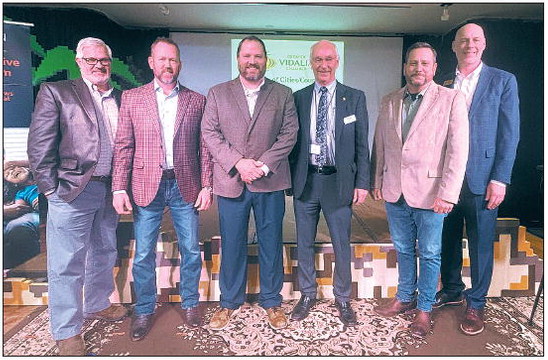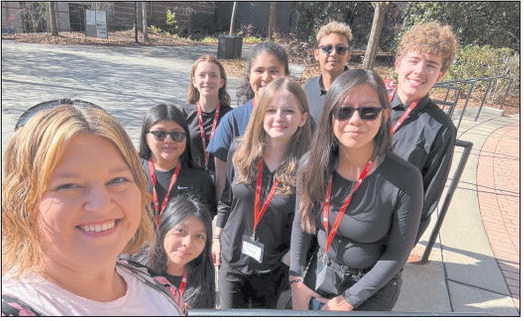Agriculture Takes $6.6 Billion Hit From Helene
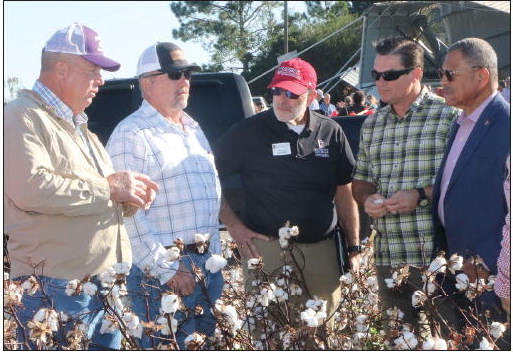

mrandolphadvance@gmail.com
Governor Brian Kemp and Georgia Agriculture Commissioner Tyler Harper visited the Phillips Family Farm in Soperton on Thursday, October 10, to discuss the estimated $6.6 billion impact which Hurricane Helene has left on the state’s agriculture.
Farm owners Ronnie and Terry Phillips are just two of the hun- continued from page
dreds of farmers across the state who were devastated by the storm on September 27. “It took 100 years to build this farm and 3 hours to destroy it,” Terry emphasized.
The men have farmed the land which was given to their family during the land grants in the 18th century for decades, as they work to grow peanuts, corn, cotton, and wheat while also raising cattle. The brothers estimate that they have lost around $500,000$750,000 of profit and infrastructure on their farm, and believe it will take them two years to rebuild.
“When you start off growing cotton in the first of May, and you get to this time of year – you’ve worked 5 months and in 3 hours, it’s gone. We spent all the money on the crop we have to spend other than the harvest cost and have lost it all. Now, we’ve got to get the crop harvested and we can’t deal with this mess until we get through harvesting,” Terry added. “The farm has been in our family since the Revolutionary War. We are not going to let it stop on our watch.”
Ronnie continued, “There was a lot of devastation with the wind and the rain. We are going to pick up, recover, and do it again next year. We’ve seen hard times on the farm before, and it won’t be the last time.”
The men’s families, along with several farmers, local and state government officials, and agriculture industry professionals gathered at the farm along Georgia Highway 46 to hear the state’s leaders discuss the disaster which farmers across the state are facing.
“The total economic impact to our rural communities, to our rural farms, to our farm families across this region is about $6.5 billion – a $6.5 billion impact in an $84 industry – that is significant. It is huge. That’s a significant impact on our rural communities, school systems, county governments, and farm families all across this part of the state,” Harper emphasized. “When it comes to direct damages, it is about $3.2 billion across agriculture and forestry in direct impacts. For comparison purposes, Hurricane Michael was about $2.5 billion – so, right now, in the preliminary estimates, we are already about $700 million more in damages than we saw in Hurricane Michael just a few years ago. That means we have a lot more work to do to help these farm families through this. It’s a larger impact to our agricultural economy than we imagined.”
The Agriculture Commissioner stated that he had been traveling across farms within Hurricane Helene’s impact zone since the storm hit, and had witnessed firsthand the devastation which the farmers face. He spoke on the damage which the Phillips Farm faced, as he explained that the men were a perfect symbol of the spirit of agriculture within the area. “This farm has been in the family since the Revolutionary War, which is amazing. It’s farm families like this that are the heartbeat of the state’s number one industry, the heartbeat of our state, the heartbeat of our economy, and the heartbeat of rural Georgia,” Harper remarked. “Thank you for what you do every single day for agriculture.”
He continued, “The damage you see around you and that you drove right through the middle of this morning – the twisted cotton, broken pine trees, and cotton lying on the ground – is very reminiscent of what we’ve seen from Valdosta to Augusta, and across the entire hurricane impact zone. It really is difficult to put into words the impact that this hurricane has had on the state’s number one industry and the farmers that fuel the industry’s success every single day. To put it simply, it is catastrophic, widespread damage that has impacted every small town and every rural community in the hurricane’s path.”
“Whether it is complete devastation of pecan orchards or poultry houses that are completely flat on the dirt, entire cotton fields and cotton production lost, or pine trees and some of our forest land dessimated, [it is catastrophic]. There are hundreds of operations and many generational family opertations – like the one we are standing on – whose future is uncertain. Before Hurricane Helene, we already had an agricultural economy that was very difficult and very tough. Now, you throw a hurricane on top of that, and it’s made our agricultural economy in Georgia just that much more difficult,” Harper told the audience.
He assured that the state government was working to do whatever possible to help farmers recover from the disaster, and that leaders were lobbying to those at the federal level for more aid.
However, Harper complimented the agriculture community in Georgia, as he said he was encouraged by the spirit of public service by farmers and producers. “It’s often said that in the worst of times, that’s when people show their true colors. As I traveled across the area, I saw farmers that lost everything, but they strapped their boots up, they got their equipment, and they took tractors to clear highways and byways for their neighbors. They did those things because they knew that’s what they were supposed to do – that’s just who they are. I think that’s what’s awesome about the agriculture community is that unbreakable bond that we have and the kindness that we have seen in aftermath of storms just like this that is incredible. It is a reminder that regardless of where you live, we are all in this together – and that is exactly what it means to be a Georgian,” he reflected.
“We’re in this for the long haul. We’re here to help our families get through this. It’s going to be a long road to recovery, but I look forward to working with all of our farmers and producers [and] all of our industry groups to deliver for Georgia families, Georgia farmers, and our state’s number one industry,” Harper summarized.
During his address, Governor Kemp also assured attendees that he would be working to make sure that farmers and foresters received aid to help them in this time of loss. “It’s what Marty and I told people as we visited probably about a dozen counties now, literally just going by suburban county by county,' said Kemp. “That we see you, we see the damage that you have had to dealt with, we will not forget you, we will continue to work on this issue, no matter what size community you are in.”
He recapped several actions that the state government has already taken in attempt to aid the relief efforts, such as suspending the gas tax, suspending semitruck weight and hours of operation governances, allowing all forms of diesel to be used for travel within the state, and extending tax filing deadlines.
Kemp recounted his work to get several small rural counties added to the federal disaster areas, as he stated that he told President Joe Biden’s chief of staff, “You’re sending a signal that you’re not paying attention to rural Georgia. You’re sending a signal to these people that you don’t realize they’re out there and the damage that they have. You need to send a signal that we are not going to forget.” After the conversation, 30 counties were added to the federal list.
“We stand ready in the governor’s office to help our congressional delegation in whatever we can to lobby for this,” he added. “We really do have a call to action to congress and to the White House. We need to take action quickly when we have numbers for the devastation that we’ve seen [for the three storms]. As Tyler mentioned, during Hurricane Michael, when we got block granted the money, it allowed us to move very quickly and cut continued from page
out federal bureaucracy and some of the previous processes.”
He encouraged attendees to thank the linemen, cut crews, and first responders helping within the impacted areas of the state, and emphasized the importance of checking on loved ones’ mental health at this time. “Y’all need to be talking to people about their mental health. You need to be looking out for your neighbor. We are all strong, tough people -but, there are times sometimes when even we need a hug, a pat on the back, or a little rest. Keep that in mind,” Kemp said.
The governor ended his address with a message of hope for those in the agriculture industry. “We are going to continue to work. This is not a one week problem; it is not a one month problem, and it’s probably not a one year problem. We’ve seen generational losses on the farm and in the forest. We know that and we are going to continue to help to come back from that in rural Georgia,” he summarized.
During the event, University of Georgia College of Agriculture Dean and Director Nick Place and Georgia Forestry Commission Director Johnny Sabo broke down the preliminary economic impact numbers for agriculture and forestry within the state.
According to Place, the college currently expects a $1.9 billion direct impact on agriculture throughout the state. He broke this amount down as so: Cotton – an estimated 500,000-600,000 bales lost and an economic impact of $220 million Peanuts – an estimated 5-7% crop loss and an economic impact of $15 million Tobacco – an estimated $3.6 million of infrastructure lost and an economic impact of $7 million Pecans – an estimated 420,000 trees lost, a $76 million replant cost, a $417 million loss of future income, and a total crop and trees economic impact of $138 million Vegetables – an estimated 40% fall crop loss and $120 million economic impact Soybeans — $7 million economic impact Citrus – an estimated 40% crop loss and $12 million economic impact Nurseries/ Ornamentals – an estimated $450 million economic impact based mostly on infrastructure and future income loss Blueberries — $52 million economic impact because of damaged plants and replanting Beef Cattle — $198 million economic impact Dairy — $100 million economic impact Poultry – an estimated 800 poultry houses lost and an economic impact of $520 million Director Sabo followed up this information, stating that Hurricane Helene traversed through 8.9 million acres of forestry and caused an estimated economic impact of $1.2 billion. He stressed the importance of this impact, as the southeastern corner of Georgia is known as the “wood basket of the world” and helps to provide timber internationally.
Georgia Speaker of the House John Burns emphasized his support for the farmers, stating that he would continue to work to help bring funding and help to rural Georgia.
Congressman Austin Scott spoke of his support of an agriculture disaster relief funding package, which would come from the federal level. “It is important that the agriculture portion of the disaster package moves at the same time as the other portion. We learned the hard way during Hurricane Michael that agriculture will get what’s left [of the package] a year or two later. That’s not acceptable. The agriculture appropriation must move at the same time that the rest of the package does,” he commented. He also shared his hope for a block grant for the state to continued from page
help in the hurricane recovery.
Congressman Buddy Carter informed the public of his proposed bill to allow forest owners to deduct the full market value of the property that was lost due to a federally qualified disaster if they agree to replant trees. He stated that this legislation would not only help property owners throughout the loss, but would also ensure that the timber was replenished.
State officials remained at the farm following the event to speak personally with farmers, as they reassured each one that help was on the way.
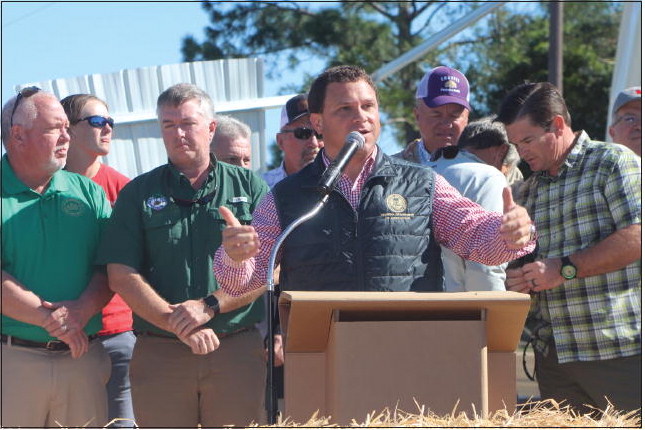
AN UNBREAKABLE BOND – Georgia Agriculture Commissioner Tyler Harper told the audience that he was encouraged by the unbreakable bond of farmers, who helped to clear roads for the public even in the midst of their own disaster.Photo by Makaylee Randolph
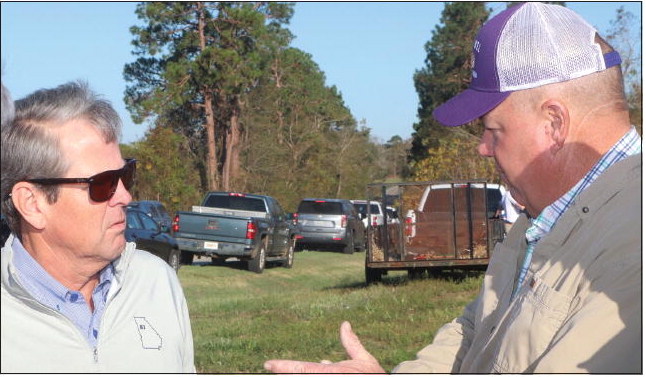
INFORMING THE GOVERNOR – Farmer Terry Phillips (right) speaks with Governor Brian Kemp (left) about the devastation of his farm.Photo by Makaylee Randolph
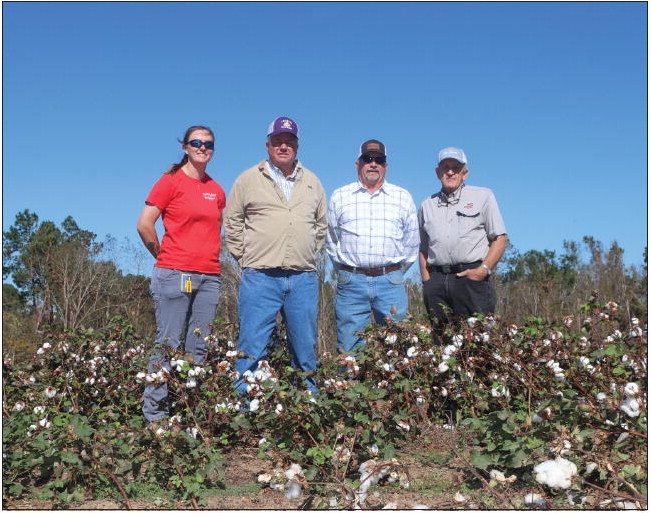
A PROMISE TO REBUILD – The Phillips brothers stated that the farm had been in their family since the Revolutionary War, and that they would come out from this disaster stronger as they rebuilt over the next two years. L to R: Brianna Phillips, Terry Phillips, Ronnie Phillips, Georgia Farm Bureau President Tom McCall.Photo by Makaylee Randolph
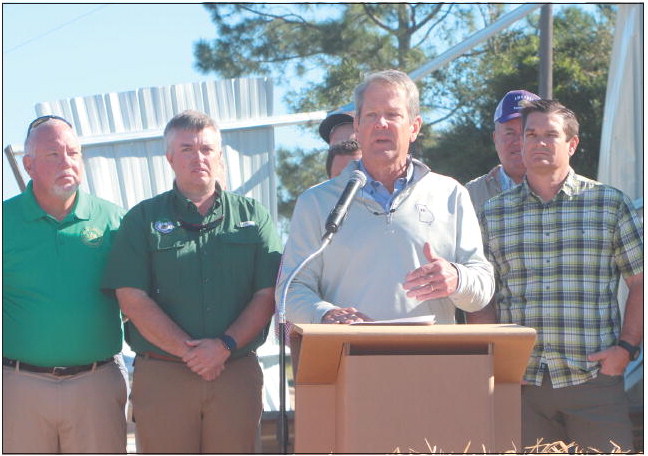
CALL TO ACTION – Governor Brian Kemp told farmers that he is working to call the federal leaders to action by lobbying for a disaster relief package and block grant for the state.Photo by Makaylee Randolph




